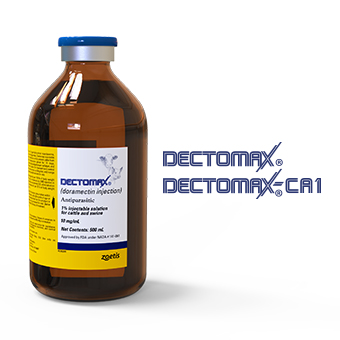Zoetis Receives Conditional Approval for Dectomax®-CA1 Injectable for the Prevention and Treatment of New World Screwworm Myiasis in Cattle
Zoetis Inc. announced that Dectomax®-CA1 Injectable is the first and only parasite control product to receive conditional approval from the U.S. Food and Drug Administration for the prevention and treatment of infestations caused by the larvae of Cochliomyia hominivorax (myiasis), and prevention of reinfestation for 21 days. This conditional approval applies to beef cattle, female dairy cattle less than 20 months of age, pregnant beef cows, newborn calves and bulls.
Zoetis is committed to supporting livestock producers with scientific solutions for this economically devastating pest. New World screwworm poses a continuing threat to livestock health, and the financial impacts of the disease to the U.S. agricultural economy are estimated in the billions of dollars.1
“New World screwworm has the potential to bring unprecedented economic and animal health harm to livestock producers,” said Mike Lormore, DVM, MS, MBA, Director of Cattle and Pork Technical Services at Zoetis. “Our top priority is to support keeping animals healthy and provide timely, efficacious solutions to our customers and partners. With this conditional approval, Dectomax-CA1 Injectable can now be used as part of safe, effective control measures against New World screwworm.”
As the leading animal health company, Zoetis has long supported a One Health approach to emerging and transboundary infectious diseases and has a strong track record of quickly developing innovative solutions to provide customers with the right mix of tools for their prevention and treatment strategies.
Livestock producers are encouraged to work closely with their herd veterinarian to implement strategic prevention and control measures. Early detection of New World screwworm and rapid response are critical to protecting the health of animals and the livestock industry. Producers are encouraged to immediately report any suspicious wounds, maggots, or infestations to their local accredited veterinarian, state animal health official, or the U.S. Department of Agriculture’s Animal and Plant Health Inspection Service. USDA APHIS animal health contacts can be found at https://www.aphis.usda.gov/contact/animal-health

